News
Published on Thu, 2013-02-07 18:54
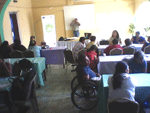
Workshop in Nicaragua.
(Photo: Coordinadora Civil)
|
The achievement of the MDGs in Nicaragua is in imminent danger due to the serious difficulties faced by virtue of several factors, such as low economic growth, increasing population demanding food and work, and growing corruption. Although there has been progress in some of them, this is not enough and does not approach the goal.
|
Published on Wed, 2013-01-30 11:59
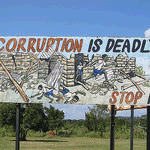
Ugandan anti-corruption sign.
(Photo : futureatlas.com)
|
The government of Uganda has continuously allocated resources to reach the Millennium Development Goals (MDGs), but its failures in fighting corruption slow down progress, says David Obot, researcher for the Development Network of Indigenous Voluntary Associations (DENIVA) and main author of the Ugandan civil society contribution to the Social Watch Report 2013. Uganda may reach three of the eight MDGs by 2015. The other goals would be missed, particularly those related to sectors where corruption is highly concentrated.
|
Published on Wed, 2013-01-30 10:08

Children in Lubumbashi.
(Photo: J McDowell, Flickr.)
|
The crisis of the Congolese economy was due to the fall in copper prices and the oil shock of 1974, followed by the "Zairisation" of the country, and it was reinforced by bad governance and high population growth, which sends every year to the labor market a lot of people of working age.
This crisis was exacerbated by the sack of 1991 and 1993 and the liberation wars of 1996 and 1998. There is great poverty in the country and we do not find the least political will in terms of job creation.
|
Published on Wed, 2013-01-30 08:05
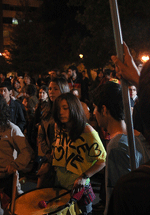
Students in Santiago, Chile
(Photo : Hans Peters/Flickr/CC)
|
Chile remains the Latin American country with the best performance in terms of achieving the goals of the Millennium Development Goals (MDGs), according to the Millennium Government Network. Despite this level of achievement, which the report estimates at about one third of the target set for 2015, the deep social unrest massively expressed in the streets by Chilean society over the past two years regarding the state of public education and health, environmental depredation by large corporations and, above all, the obvious widening of the gap of inequality, raise questions about what this means in practice.
|
Published on Fri, 2012-12-14 08:45
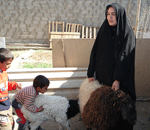
Iraqi widow with her sons.
(Photo: CODEPINK Women
For Peace/Flickr/CC)
|
Political disputes and security challenges have hindered the stability required for the development of Iraq, according to the Iraqi Al Amal Association’s contribution to the Social Watch Report 2013. To get on the right track, says Al Amal, the Iraqi government must conduct the census that has been delayed since 2007, to collect reliable information for the design of comprehensive, effective and appropriately funded development plans.
|
Published on Fri, 2012-12-14 08:42
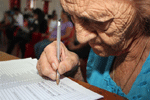
A Salvadorean woman learns to
write and read. (Photo: MINED)
|
The first leftist government in El Salvador has been devoted, in the last three years, to support marginalized populations such as the elderly, women, children and the rural population, says the Salvadorean contribution to the Social Watch Report 2013. Improvements in health and education are apparent, but structural changes are needed to ensure the sustainability of the social programs, including a tax reform to finance them with the national budget without relying on external funds.
|
Published on Fri, 2012-12-14 08:38
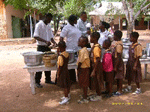
School lunch in Ghana
(Photo: Ndcuk.org)
|
The lack of political will seems to be the main obstacle on Ghana’s road to development and human well-being, but it is not the only one, according to the contribution from civil society organizations of this West African nation to the Social Watch Report 2013.
Ghana has walked a long way towards poverty eradication, food security and education to all, but not all the people have access to medical services, and not all pregnant woman benefit from free health care, so maternal mortality remains very high, aggravating the endemic gender inequities. With this social landscape as a backdrop, the economy experiences a sustained growth, notes the report.
|
Published on Fri, 2012-12-14 08:35

Photo: The Palestinian Monitor
|
The military raid on the offices in Ramallah of the Palestinian NGO Network (PNGO, member of Social Watch), Women’s Union and Addameer “adds to the Israeli record of continuous violation” of the international humanitarian law and human rights treaties, and proved once again that the occupation “is the major (…) obstacle” that prevents the Palestinian society from reaching its development, stated the Arab NGO Network for Development.
|
Published on Fri, 2012-12-14 07:40
The international conference “Advancing the post-2015 sustainable development agenda: Reconfirming rights, recognizing limits, redefining goals” in Bonn will bring together about 250 civil society activists and representatives from key stakeholders in March in order to draw together civil society inputs into this relevant debate.
|
Published on Fri, 2012-12-07 13:00

Members of the Alternative Budget
Institute (ABI), a consortium of 60
non-governmental organizations
led by Social Watch Philippines,
called on citizens to vote only for
candidates supporting the MDGs.
(Photo: ABI-ENVI)
|
The Philippines needs a post-2015 development agenda that reclaims human rights as the normative framework, especially ensuring the right to education, health and decent work, and addressing the long-standing inequalities, concludes the report 2013 of Social Watch-Philippines. Economic growth averaged 4.7 per cent a year since 2000 in this South Asian country, but only the elites harvested the benefits, while poverty increased to reach more than one of every four Filipinos, says the study.
|
SUSCRIBE TO OUR NEWSLETTER
Submit

|











